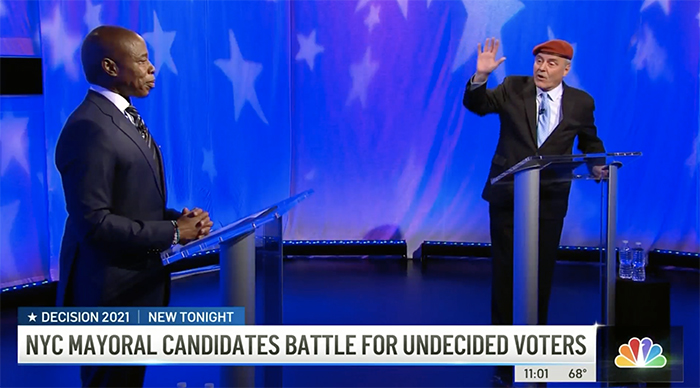
Mayoral Candidates Spar In Debate As Election Draws Closer
MANHATTAN — New York City’s top-ticket candidates for mayor faced off in a televised debate on Oct. 20, taking questions on hot-button issues — like crime, economic recovery, and school vaccine mandates — while also blasting each other’s character.
Voters on Nov. 2 will decide the next mayor—likely, one of those debating: either Democrat Eric Adams, Brooklyn Borough president and a retired police captain, or Republican Curtis Sliwa, radio personality and founder of the Guardian Angels. The race also includes eight down-ballot candidates for mayor.
The hour-long debate, carried on WNBC 4 New York, was the first verbal grapple between the two frontrunners. They addressed issues including:
School Vaccine Mandates
Moderators asked the candidates if they favored mandatory vaccines for public school children to protect them from COVID-19.
Adams said he’d advocate for the vaccines as being just as important as the shots for measles and mumps, but he is open to alternatives for parents who steadfastly refuse vaccines for their children.
“I am open to remote-learning options — whatever we can do to educate our children and protect our children at the same time,” Adams said.
Sliwa said he has been vaccinated against various diseases, but he has opposed vaccine mandates.
“I have three sons who are in the public school system,” he said. “And I saw what happened for the year and a half when they were forced to have virtual learning at home, unlike the parochial schools who did a magnificent job of getting the teachers and the children in the classroom. Notice, they didn’t have problems.
“But how about getting parental involvement? Do we not want parents involved in this process?”
Crime (Gun Violence)
Sliwa advocated a return to the controversial “stop-question-and-frisk” tactic, but would focus it in high-crime areas to stem escalating gun violence.
“And I suggest that it be used especially in areas where there is gang activity, gang wars, constant shootings, constant gun activity,” he said. “It should at least be utilized by police officers who have to preemptively stop the gangs.”
Sliwa said the tactic was abused with a quota system starting when Michael Bloomberg was mayor. He said Adams was complicit with the quotas.
Adams countered by repeating how he was harassed and arrested by police in his youth; he joined the Police Department, hoping to build reform from the inside. He has favored a return of the anti-crime unit that Mayor Bill de Blasio disbanded last year, but with more oversight.
“I never called for aggressive police tactics, but I called for appropriate police tactics,” he said. “The new anti-gun unit, they will zero in on gangs and guns, precision policing, but also precision resources.”
The Economy
Adams was born in Brooklyn but also spent part of his youth in Queens. He said the city’s economic recovery from COVID-caused downturns depends on making the city friendlier to businesses, especially those emerging from cutting-edge science like bio-tech, cyber-security, and drone manufacturing.
But, he added, the city’s schools and colleges must provide education and training to equip students with the skills needed to work in those industries.
Sliwa reiterated that improving quality-of-life issues like crime, mental illness services, and homelessness will restore the city’s appeal and stem the flow of current residents fleeing the city.
To that end, for example, he favored the “repurposing” of shuttered manufacturing plants and conversion of shut housing units into affordable housing.
Character
Up-to-date polling has not been released as of this writing, but several media outlets suggest Adams is leading in the race, considering the Democratic Party’s dominance in the city.
Therefore, it was no surprise to see Sliwa go on the offensive with jocularity, frequently painting Adams as a country club politician. He restated questions raised earlier in the campaign about whether the borough president actually lives in Brooklyn.
Sliwa, who is from the Canarsie neighborhood of Brooklyn, asserted repeatedly that Adams has aligned himself with the outgoing mayor.
“Eric, Eric you’re with the elites,” Sliwa said. “You’ve got potholes galore, graffiti, garbage all over Brooklyn. The quality of life is zilch; you have to take responsibility with your partner, de Blasio.”
But Adams, 61, noted Sliwa’s apologies for his promoting the Guardian Angels in the early days of the citizens’ patrol group by making up stories about their heroics.
“It’s clear that he makes up things, like he made up his crimes,” Adams said. “We understand that.”
Sliwa, 67, said he has apologized for that, and added, “I made mistakes, I was immature at the age of 25.”
Moderators asked Adams to estimate how many nights he spends at his Brooklyn brownstone.
“I stay at my brownstone, I live in Brooklyn, that’s my primary residence,” he said. “I’ll spend time in Borough Hall because, sometimes, I work until four or five at night and I put my feet up on a desk like I did when I was in the police precinct. But that’s my primary residence, I don’t just jot down the number of days I’m there, but that’s where I lay my head.”
